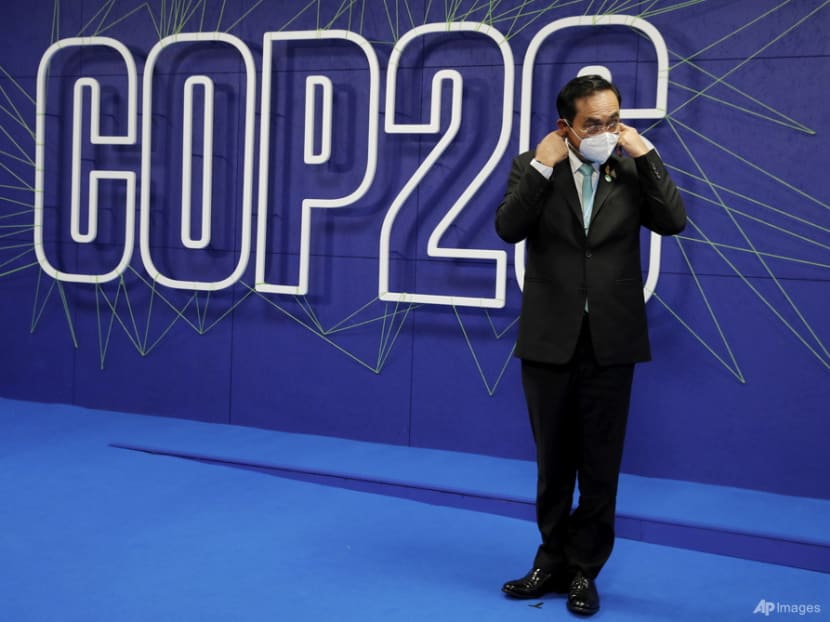Climate change ‘a matter of life and death’, Thai PM Prayut says at COP26 summit

Thailand's Prime Minister Prayut Chan-o-cha arrives for the COP26 summit at the Scottish Event Campus (SEC) in Glasgow, Nov 1, 2021. (Phil Noble/Pool via AP)
GLASGOW: Climate change is the “gravest challenge of our time”, Thailand Prime Minister Prayut Chan-o-cha told COP26 - the United Nations’ global climate change conference being held in Glasgow - on Monday (Nov 1).
During his speech at the World Leaders Summit, Prayut said that the stakes have never been higher to reach a common goal in combating the crisis, while highlighting Thailand as one of the most vulnerable nations to the damaging impacts of climate change.
“This is a matter of life and death for our world and the future of our children,” he said.
“Time is running out and we can no longer afford to be complacent in combating climate change for it means the end of the world as we know it.
“This is a war that man can join hands in, not to destroy one another but to fight against a common enemy we ourselves created and to right the wrongs we inflicted on this planet.”
AMBITION CONTINGENT ON FUNDS
Prayut said that Thailand was willing to step up its level of ambition to achieve net zero emissions by the middle of the century, 15 years faster than currently pledged, if the country received the necessary funds and technology from richer nations.
“I’m here to express Thailand’s willingness to be more aggressive in addressing the climate change challenges in every way and by every means possible,” he said.
“With the adequate, timely and equitable support of technology transfer and cooperation and, most importantly, availability of and access to ample green financing facilities, Thailand can increase our NDC (nationally determined contribution) to 40 per cent and reach our net zero by 2050.”
Scientists have warned that the world needs to limit warming to 1.5 degrees Celsius above pre-industrial levels, or face devastating consequences. To do so, carbon neutrality across the globe needs to be reached by around 2050.
Regional neighbours to Thailand, including Malaysia and Laos, have recently adopted 2050 targets. Prayut did not indicate if or when Thailand would follow suit, reaffirming that the country’s current target remained to reach net zero emissions “in or before 2065”.
"BIO-CIRCULAR GREEN ECONOMY MODEL"
He highlighted the progress that had been made so far in lowering emissions in the energy and transport sector, and said that a “bio-circular green economy model” was now a national priority.
“It is a paradigm shift that leads to eco-friendly economic growth,” he said.
Thailand was among the countries that had failed to upgrade its climate targets for this decade as part of its Nationally Determined Contributions (NDC), a mechanism that forms part of the Paris Agreement to ensure countries ramp up action over time.
The existing Thai NDC, submitted last year, aims to reduce domestic emissions by 20 per cent compared to business-as-usual by 2030, a target criticised by experts as inadequate.
With international assistance, Thailand could aim for a 40 per cent reduction, Prayut said.
Developing countries are striving hard to mobilise more climate finance, which was an integral pillar in the Paris Agreement of 2015.
The world’s richest nations committed then to deliver US$100 billion every year, a promise which has not been realised, much to the chagrin of poorer nations already bearing the brunt of climate change.
G20 nations - the biggest economies in the world - are responsible for more than 80 per cent of global emissions. Thailand is about the 20th largest emitter in the world, but only contributes approximately 0.72 per cent of the total carbon output.







